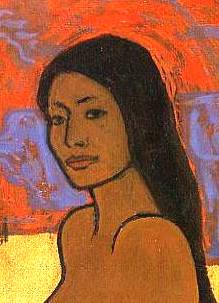The "eternal feminine"
 ...
woman assumes, face to face with man, an aspect of Divinity: her nobility,
compounded of beauty and virtue, is for man like a revelation of his own
infinite essence and so of what he 'would wish to be' because that is
what he 'is'. [Castes and Races, p.34.]
...
woman assumes, face to face with man, an aspect of Divinity: her nobility,
compounded of beauty and virtue, is for man like a revelation of his own
infinite essence and so of what he 'would wish to be' because that is
what he 'is'. [Castes and Races, p.34.]
..."woman" is Beauty, or the attractive and liberating vision of God in forms that manifest Him or that manifest His radiant Goodness; the "eternal feminine" also represents this Goodness in itself, inasmuch as it forgives, welcomes and unifies, by freeing us from formal and other hardenings... [Esoterism as Principle and as Way , p. 43, note 33].
Every religion necessarily integrates the feminine element -- the "eternal feminine"(das Ewig Weibliche) if one will -- into its system, either directly or indirectly; Christianity in practice deifies the Mother of Christ, despite exoteric reservations, namely the distinction between latria and hyperdulia. Islam for its part, and beginning with the Prophet, has consecrated femininity, on the basis of a metaphysics of deiformity; the secrecy surrounding woman, symbolized in the veil, basically signifies an intention of consecration. In Moslem eyes, woman, beyond her purely biological and social role, incarnate two poles, unitive "extinction" and "generosity", and these constitute from the spiritual point of view two means of overcoming the profane mentality, made as it is of outwardness, dispersion, egoism, hardness and boredom. The nobleness of soul that is or can be gained by this interpretation or utilization of the feminine element, far from being an abstract ideal, is perfectly recognizable in representative Moslems, those still rooted in authentic Islam.(1). [In the Face of the Absolute, p. 227-228].
(1) It is always this we have in view, and not so-called "revivals" which monstrously combine a Moslem formalism with modernist ideologies and tendencies.
Femininity
The 'Eternal Feminine'
Eve and Mary
Man and Woman
The feminine body
Feminism
